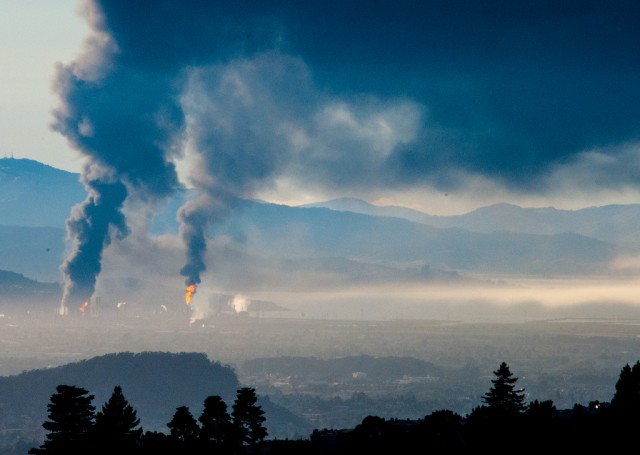Sylvia Gray White told the board she was among the 15,000 East Bay residents who sought hospital treatment after the refinery fire sent a thick plume of black smoke across much of western and northern Contra Costa County. "Breathing air full of toxic chemicals has drastically reduced our quality of life," White told the board.
The five-hour meeting heard a summary of the staff report. It echoes the board's preliminary findings, which blamed the fire on Chevron's repeated failure to follow advice from its own safety experts and install a safer type of steel in key parts of the refinery. High sulphur content in crude oil processed at the refinery caused older pipes to thin, then rupture, sparking the fire.
As the Contra Costa Times' Robert Rogers reports, sign before the meeting suggested the board would adopt the report:
Prior to Wednesday's meeting, Board Chairman Rafael Moure-Eraso was firm in his belief that the safety case regime was the right approach. He was the lone vote in favor of adopting the staff report.
"We have a refinery safety problem in the U.S.," Moure-Eraso said. "The current regulatory system is clearly not working."
Moure-Eraso's sentiments were echoed by Dan Tillema, a lead investigator for CSB.
"I don't see any downside to the safety case regime," Tillema said. "But there will be industry resistance."
And, Rogers adds, the industry did express opposition to the new safety regime in written comments:
"Adopting the safety case regime would add complexity and uncertainty" without guaranteed benefits, said Ron Chittim, a senior policy adviser for the American Petroleum Institute.
In a written statement released earlier Wednesday, Western States Petroleum Association President Catherine Reheis-Boyd urged California and Contra Costa officials to take "a thoughtful and cautious approach."
Reheis-Boyd wrote that moving too quickly to adopt some of the programs recommended by the CSB could inject a high level of complexity and confusion into long-standing and successful safety programs.
"We must be very careful in how we introduce change, especially into programs that have a long record of acceptance and success," she wrote.
When it came time to vote on adopting the staff report and the "safety case" recommendations, the board members split.
Chemical Safety Board member Mark Griffon moved to put off voting on the report, saying that the agency needs more time to iron out transitional issues and address unanswered questions raised by the public, including whether the California Division of Occupational Health and Safety, Cal-OSHA, is authorized to require refineries to correct safety hazards in a timely manner.
Griffon suggested postponing a decision for 120 days to allow a panel to amend the report by addressing how to address potential obstacles.
Board member Beth Rosenberg also voted to delay a decision Wednesday night, saying, "I am 90 percent sure that I want regime change in the United States. I want to do it from a position of strength."
Moure-Eraso voted to adopt the report and new safety regime; Griffon and Rosenberg voted for the 120-day delay.
This post contains material from Grace Rubenstein of KQED News and Bay City News.
